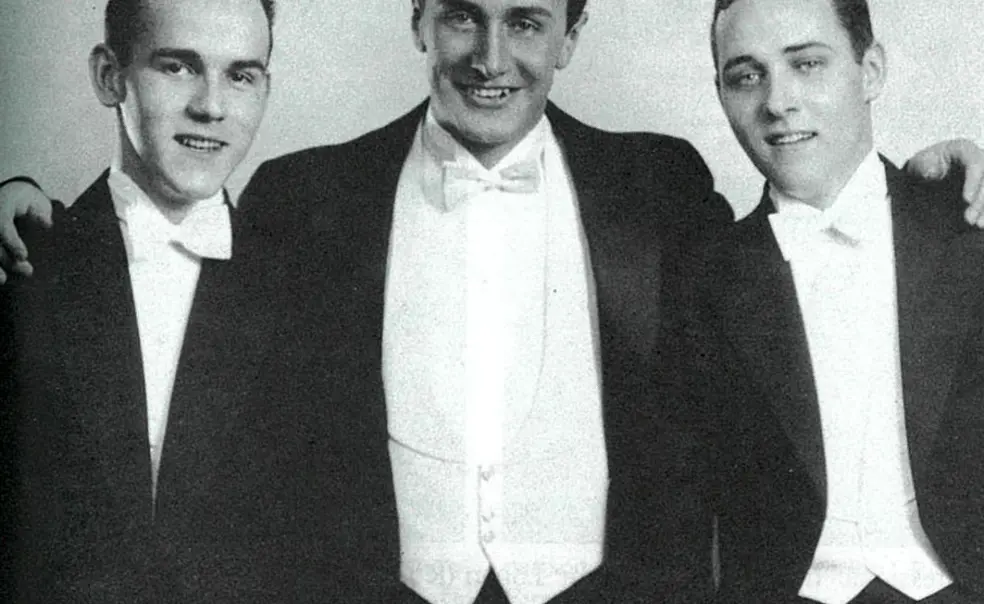Every September, the Triangle Club greets first-year students with a revue of its strongest material. Newer songs come and go, but there is one constant: “East of the Sun and West of the Moon.” Brooks Bowman ’36 wrote the song as part of the score for Stags at Bay, the Triangle show in his junior year.
Bowman’s songs were the first Triangle Club tunes to be published commercially, and “East of the Sun” became a breakout hit. In 1935, it topped the Lucky Strike Hit Parade. Bowman’s classmates began to call him “Princeton’s answer to Yale’s Cole Porter,” and he wrote a third of the score for the next Triangle show. Instead of attending law school after graduation, he moved to Los Angeles for a songwriting job at Warner Brothers. Though he’d written music for Triangle, Bowman saw himself as a lyricist above all else. He left Hollywood after less than a year to collaborate with a composer from Triangle, Bill Borden ’37.
On the weekend of Oct. 16, 1937, days before his 24th birthday, Bowman drove to New Haven to attend a football game with a group of friends. He and Borden had been offered a publishing contract for their latest song, and were expected to sign the deal at a meeting the following Monday. But as Bowman and his friends returned home from the game, a tire blew and the rear end of the car slammed into a stone wall. Three other passengers sustained only minor injuries, but Bowman died in the crash.
Decades after his tragic death, Bowman is remembered through his most enduring song, which has been recorded Frank Sinatra, Billie Holiday, Louis Armstrong, and Diana Krall — and highlighted in this 1973 PAW column by Frederic Fox ’39.
Princetoniana: ‘East of the Sun (and West of the Moon)’
(From the Oct. 2, 1973, issue of PAW)
Royalties continue to pour into the Triangle Club from every playing of “East of the Sun (and West of the Moon).” This song, written by Brooks Bowman ’36 for the 1934-35 Triangle show, Stags at Bay, has become an American classic.
Brooks was Princeton’s answer to Yale’s Cole Porter. And Porter recognized his genius. Just a few months before Brooks’ sudden death at the age of 23 in 1937, Porter gave him a personal introduction to the brightest luminaries on New York’s Tin Pan Alley.
Another case of genius recognizing genius was the way F. Scott Fitzgerald ’17 immediately recognized Brooks’ talent. In 1935, after seeing Stags at Bay, Fitzgerald wrote him a letter calling him the brightest spot in the show, “both as actor and composer.” (F. S. F. then went on to suggest a few changes to make the song “suitable” for singing in Palmer Stadium.)
Fitzgerald’s praise must have sounded sweet to Brooks, sweeter than the academic honors he received in philosophy. After all, he had transferred to Princeton from Stanford mainly to sing and dance in McCarter Theatre.
Brooks flourished here. Besides Triangle, he sang in the Glee Club, wrote for the Tiger, and did well enough as a student to think of going on to Harvard Law School to prepare for a career as a crimebuster.
Though he is remembered as a romantic troubadour, Brooks had a strong interest in criminal justice, especially capital punishment. He wrote his thesis on the ethical justification of it, taking a hard stand against murderers. Anyone who reads his thesis today would find it difficult to imagine the author as a lyrical poet “living on love and pale moonlight.”
While he could sing of harmony among the stars, Brooks was utterly opposed — in his thesis — to the “rotten sentimentalism and casuistry which permeate our (earthly) problems from start to finish.” He had no use for the sympathies of people he might have considered “bleeding hearts.”
After graduation, he decided to stick with the stars and write songs for Warner Bros. in Hollywood. So he went West, starting out at the then glamorous salary of $100/week — even though he really didn’t know how to play the piano — and he rented “a one-room apartment with a lovely blue carpet and blue curtains and white and silver wallpaper” for $37.50 a month. Soon after his arrival, Hoagy Carmichael called him to come over to his apartment on Sunset Blvd. to write some lyrics for a tune he had just composed. So they stayed up all night hammering out “You and Romance and Me.”
But Brooks wasn’t really made for Hollywood. When his old Triangle friend, Bill Borden ’37 (a real piano player), came out for a visit, Brooks proposed they return East as a song-writing team: Bowman on words and Borden on piano.
Impressed by the mounting popularity of “East of the Sun,” a New York music publisher accepted their first collaboration with enthusiasm. He told them to come by Monday to sign the contract and collect their advance. But Brooks died on that Saturday, crushed in a car against a stone wall near Poughkeepsie. — Frederic Fox ’39










No responses yet